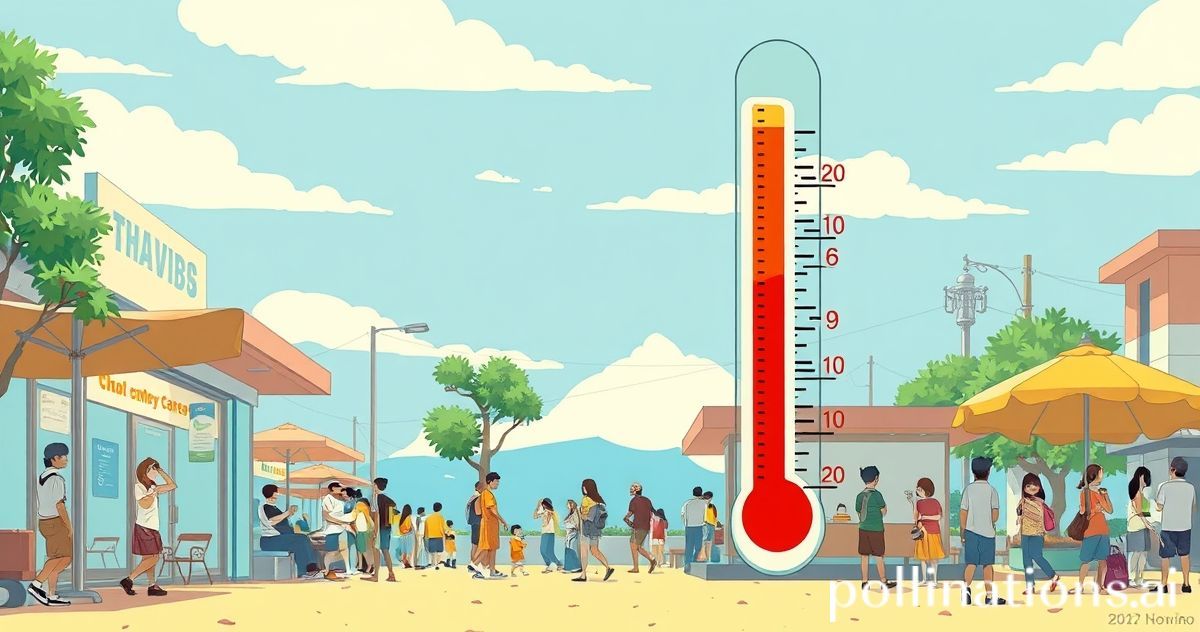Seoul issued its first heatwave warning of the year on July 7th, marking an 18-day earlier onset compared to last year's "historically worst heat" period (July 25th). With this early heatwave warning and the end of the monsoon season, this summer's heat is expected to be unusually prolonged.
Heatwave Warning Status
According to the Korea Meteorological Administration, the heatwave advisory issued at 10 AM on July 7th for Seoul and the metropolitan area, including regions west of the Baekdu-daegan mountain range, was upgraded to a heatwave warning. A heatwave warning is the highest level of heat advisory, issued when the maximum apparent temperature exceeds 35°C for two or more consecutive days or when significant heat-related damage is expected.
Seoul's maximum temperature is forecast to reach 36°C on July 8th and 9th, with apparent temperatures expected to be even higher. Suffocating heat that makes breathing difficult even while stationary is expected to continue throughout the week.
Regional Temperature Status
While maximum temperatures across most regions nationwide exceed 30°C, extreme heat with temperatures surpassing 35°C is occurring in the Gangwon coastal areas and Yeongnam inland regions. On July 1st, temperatures recorded included Gangneung 36.7°C, Gumi 36.2°C, Miryang 36°C, Bukgangneung 35.9°C, and Pohang 35.8°C.
The Korea Meteorological Administration explained that while the eastern regions along the Baekdu-daegan mountain range, including Gangneung and Sokcho in Gangwon, experienced higher temperatures since late last month, this week will see hotter conditions in Seoul and the metropolitan areas west of the Baekdu-daegan as wind patterns shift from southwest to east winds.
Persistent Tropical Nights
Tropical night phenomena, where temperatures don't drop at night, are being observed across the country. Nighttime minimum temperatures on July 1st included Gangneung 29.7°C, Pohang 27.4°C, Seogwipo 27.3°C, Ulleungdo 26.8°C, Cheongju and Uljin 26.3°C, and Seoul 26.2°C.
Seoul recorded a minimum temperature of 25.6°C on June 30th, marking the fourth consecutive year of June tropical nights since 2022, demonstrating how early this summer's heatwave began.
Government Heatwave Response
The government is responding from multiple angles to minimize heatwave-related damage. The Ministry of the Interior and Safety stated, "We will mobilize all administrative resources to protect citizens' health and property from this record-breaking heatwave."
The National Fire Agency has established the world's first national-level 119 emergency reporting system to respond quickly to heatwave-related emergencies. Local governments are also expanding the operation of cooling centers and implementing special protection measures for vulnerable populations.
Surge in Heat-Related Illness Concerns
Heat-related illnesses have increased dramatically this year, requiring special attention. According to Korea Disease Control and Prevention Agency data, heat-related illness cases this year have exceeded 800, representing an 83% increase compared to the same period last year.
Particularly high rates of heat-related illness are occurring among those aged 65 and older, chronic disease patients, and outdoor workers, requiring special attention and protection for these groups.
Heatwave Prevention Guidelines
The government has advised the following prevention measures to prevent heatwave-related damage:
First, avoid going outdoors between 12 PM and 5 PM when possible, and wear parasols or hats when outdoor activities are unavoidable.
Second, adequate hydration is crucial, developing habits of drinking water before feeling thirsty. However, alcohol and caffeinated beverages should be avoided.
Third, wear cool, well-ventilated clothing and maintain appropriate indoor temperatures (26-28°C).
Fourth, if heat illness symptoms such as dizziness, nausea, or headaches appear, immediately rest in a cool place and call 119 if necessary.
Climate Change and Heatwaves
Experts warn that this heatwave will continue as a result of climate change. South Korea faced record-breaking heatwaves in summer 2024, and 2025's June average temperature recorded the highest in history, showing intensifying abnormal high-temperature phenomena.
Environmental organizations like Greenpeace argue that "heatwaves are no longer a future problem but a realistic threat and climate disaster we face now," and "the government must strengthen responses to climate crisis and urgently implement fundamental measures like greenhouse gas reduction."
Economic Impact
Heatwaves affect not only health but also have significant economic impact. Electricity usage is surging, increasing utility bill burdens, and livestock and crop damage is a concern in the agricultural sector.
Particularly in industries with significant outdoor work like construction and manufacturing, productivity decline is inevitable due to shortened working hours and extended break times.
International Trends
Heatwave phenomena are intensifying not only in Korea but worldwide. Record-breaking heatwaves are continuing in the United States, Europe, and China, demonstrating that global warming is a planetary phenomenon.
The World Meteorological Organization (WMO) forecasts that 2025 is likely to be one of the hottest years on record, making heatwave response no longer optional but essential.
Future Outlook
The Korea Meteorological Administration announced that this heatwave is expected to continue until mid-July. While there may be temporary temperature drops due to typhoon influence, overall temperatures are forecast to remain higher than normal.
Long-term forecasts suggest above-normal temperatures may continue through August, making urgent preparation of long-term heatwave countermeasures necessary. It's time for government, local authorities, and individuals to actively respond to heatwaves.

Original Korean article: https://trendy.storydot.kr/society/seoul-first-heatwave-warning-summer-2025


0 Comments